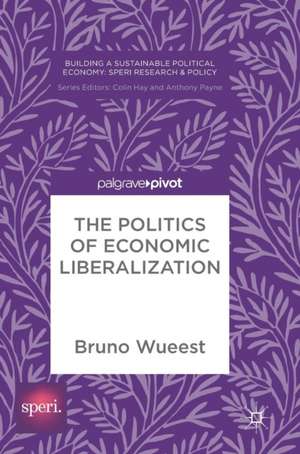The Politics of Economic Liberalization: Building a Sustainable Political Economy: SPERI Research & Policy
Autor Bruno Wueesten Limba Engleză Hardback – 27 oct 2017
This book analyses the discourses of economic liberalization reform in six Western European countries – Germany, France, the United Kingdom, the Netherlands, Switzerland and Austria. It provides systematic empirical evidence that policy-related discourses are much more than noise; rather, they are detailed expressions of institutional complementarities and political struggles. The author posits that the more open a discourse, the broader the range of perceived interests, which, in turn, increases the intensity of conflicts. Similarly, the more public discourse centres on coordination, the more intense actors need to engage with opposite interests, which most probably intensifies political disputes as well. Moreover, Wueest argues that the formation of a consensus within the political mainstream has left a vacuum for outsider parties such as Syriza in Greece and Podemos in Spain to feed on the contentiousness of economic liberalization policies.
| Toate formatele și edițiile | Preț | Express |
|---|---|---|
| Paperback (1) | 321.09 lei 38-44 zile | |
| Springer International Publishing – 24 aug 2018 | 321.09 lei 38-44 zile | |
| Hardback (1) | 389.49 lei 6-8 săpt. | |
| Springer International Publishing – 27 oct 2017 | 389.49 lei 6-8 săpt. |
Din seria Building a Sustainable Political Economy: SPERI Research & Policy
- 17%
 Preț: 361.24 lei
Preț: 361.24 lei -
 Preț: 279.72 lei
Preț: 279.72 lei -
 Preț: 447.48 lei
Preț: 447.48 lei -
 Preț: 383.33 lei
Preț: 383.33 lei -
 Preț: 386.81 lei
Preț: 386.81 lei -
 Preț: 384.70 lei
Preț: 384.70 lei - 15%
 Preț: 531.41 lei
Preț: 531.41 lei -
 Preț: 392.21 lei
Preț: 392.21 lei -
 Preț: 415.86 lei
Preț: 415.86 lei - 18%
 Preț: 900.01 lei
Preț: 900.01 lei - 18%
 Preț: 730.47 lei
Preț: 730.47 lei - 15%
 Preț: 499.92 lei
Preț: 499.92 lei - 15%
 Preț: 475.62 lei
Preț: 475.62 lei -
 Preț: 484.47 lei
Preț: 484.47 lei -
 Preț: 377.18 lei
Preț: 377.18 lei - 18%
 Preț: 892.28 lei
Preț: 892.28 lei -
 Preț: 386.61 lei
Preț: 386.61 lei -
 Preț: 382.36 lei
Preț: 382.36 lei -
 Preț: 386.39 lei
Preț: 386.39 lei -
 Preț: 393.13 lei
Preț: 393.13 lei
Preț: 389.49 lei
Nou
Puncte Express: 584
Preț estimativ în valută:
74.55€ • 81.01$ • 62.66£
74.55€ • 81.01$ • 62.66£
Carte tipărită la comandă
Livrare economică 21 aprilie-05 mai
Preluare comenzi: 021 569.72.76
Specificații
ISBN-13: 9783319623214
ISBN-10: 3319623214
Pagini: 169
Ilustrații: XIV, 169 p. 9 illus.
Dimensiuni: 148 x 210 mm
Greutate: 0.45 kg
Ediția:1st ed. 2018
Editura: Springer International Publishing
Colecția Palgrave Macmillan
Seria Building a Sustainable Political Economy: SPERI Research & Policy
Locul publicării:Cham, Switzerland
ISBN-10: 3319623214
Pagini: 169
Ilustrații: XIV, 169 p. 9 illus.
Dimensiuni: 148 x 210 mm
Greutate: 0.45 kg
Ediția:1st ed. 2018
Editura: Springer International Publishing
Colecția Palgrave Macmillan
Seria Building a Sustainable Political Economy: SPERI Research & Policy
Locul publicării:Cham, Switzerland
Cuprins
Chapter 1. Introduction: Mapping economic liberalization discourse in Western Europe.- Chapter 2. Institutional and structural foundations of discourse.- Chapter 3. Designing the discourse analysis.- Chapter 4. Unity on the substance of discourse.- Chapter 5. Diversity in the structure of discourse.- Chapter 6. Conclusion: United in diversity.
Recenzii
“Bruno Wueest’s Politics of Economic Liberalization is a timely contribution to the literature on comparative political economy and policy discourse. … Wueest sheds new and welcome light on old debates concerning policy convergence and divergence, institutional complementarities and comparative advantage, political polarization, access and representation.” (Matt Wilder, Swiss Political Science Review, Vol. 25 (2), 2019)
Notă biografică
Bruno Wueest is Research and Teaching Fellow at the University of Zurich, Switzerland. His research interests are distinctly interdisciplinary and include political communication, comparative political economy and computational linguistics. He works on the automated analysis of tweets, open survey questions, parliamentary debates and newspaper articles.
Textul de pe ultima copertă
This book analyses the discourses of economic liberalization reform in six Western European countries – Germany, France, the United Kingdom, the Netherlands, Switzerland and Austria. It provides systematic empirical evidence that policy-related discourses are much more than noise; rather, they are detailed expressions of institutional complementarities and political struggles. The author posits that the more open a discourse, the broader the range of perceived interests, which, in turn, increases the intensity of conflicts. Similarly, the more public discourse centres on coordination, the more intense actors need to engage with opposite interests, which most probably intensifies political disputes as well. Moreover, Wueest argues that the formation of a consensus within the political mainstream has left a vacuum for outsider parties such as Syriza in Greece and Podemos in Spain to feed on the contentiousness of economic liberalization policies.
Caracteristici
The author draws upon 10,000 policy statements for their data, which they gathered in an original quantitative content analysis of quality newspapers An empirical study on the discourse of six Western European countries – Germany, France, the United Kingdom, the Netherlands, Switzerland and Austria Adds a new quantitative approach to the discursive institutionalist literature, which is currently in demand Includes supplementary material: sn.pub/extras
